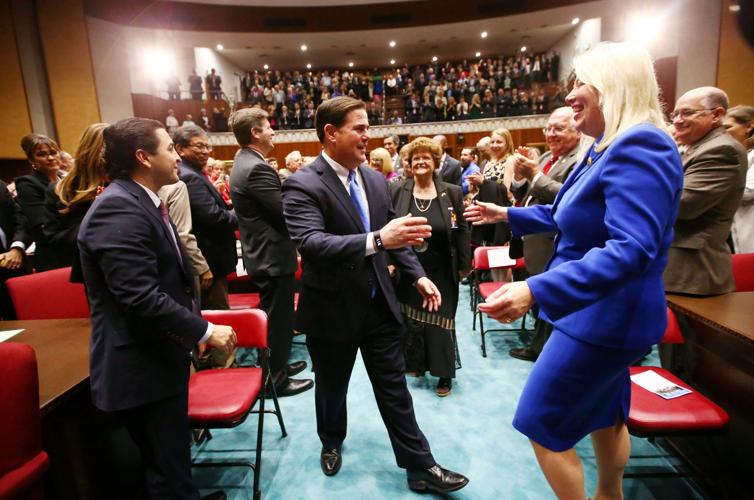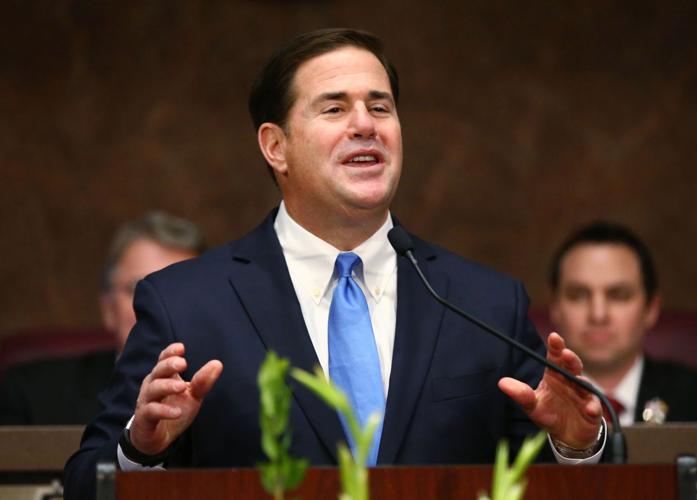PHOENIX — Saying he takes his promise seriously, Gov. Doug Ducey on Monday said he wants to put more money into public education.
But Arizonans will have to wait until Friday when the governor releases his budget proposal to find out what that means in dollars.
In his nearly hour-long State of the State address, the governor acknowledged that in pushing voters to approve Proposition 123 last May, he vowed the $3.5 billion 10-year program would be just the “first step” in improving education funding. On Monday, Ducey said he was ready to make “a commitment our educators can take to the bank.”
That includes promises of increased state aid and higher teacher pay. And he said he had special programs designed to get teachers into schools in areas of high poverty.
But the biggest surprise was Ducey partly reversing course on a decision he and state lawmakers made two years ago to make Arizona the stingiest state for Temporary Assistance to Needy Families. That program provides cash benefits for families with children.
For a family of three, the monthly benefit is $278.
At the time, Arizona was among those at the bottom of the list at 24 months. Lawmakers approved — and Ducey signed — a measure to slash that in half, putting Arizona at the bottom of benefits.
At that time there was a sentiment among some Republicans the change would encourage people to work.
“As a society, we are encouraging people at times to make poor decisions and then we reward them,” then-Sen. Kelli Ward said at the time.
Monday, however, Ducey had a different take on the issue.
He acknowledged it can be tricky to provide a safety net while not providing incentives for people to be out of work. But the governor said he recognizes that not everyone collecting benefits is anxious to remain there.
“No one wants to be on government assistance,” he said. “So why don’t we reward those who are making an honest effort to get off unemployment, or food stamps or welfare, those who are looking for work, making sure the kids do the homework, and trying to stop the cycle of poverty.”
The specific plan would reinstate 24 months of benefits for Arizonans who are actively looking for a job or who have kids who are attending schools and have an attendance record of at least 90 percent.
“It’s the right thing to do,” Ducey told Capitol Media Services when asked after his speech about the revised philosophy.
Gubernatorial press aide Daniel Scarpinato said he believes about 70 percent of those receiving TANF benefits will qualify. He also said that Ducey has more flexibility now with state funds than he did two years ago when Arizona was facing a $1.5 billion deficit.
Ducey provided no hard figures on the price tag. And that worried House Speaker J.D. Mesnard.
“I’m comfortable with 12 months,” he said. “We can always revisit what we think makes the most sense.”
And the new speaker said the plan may be a hard sell among Republicans.
“I think we should remember that welfare was meant to be as short amount of time as possible,” Mesnard said. “We don’t want people to become dependent.”
But the broadest proposals the governor outlined Monday were on public education, with Ducey saying he’s finally ready with what he dubbed “Steps 4, 5 and 6” on top of Proposition 123.
The first, he said, is more resources for schools, above what is required by a voter-mandated inflation formula.
“Now, I’m not promising a money tree,” the governor told his audience.
“There’s no pot of gold or cash hiding under a seat cushion,” he explained. “And unlike Washington, we don’t print money.”
Ducey said he has no intent of raising taxes.
Step 5, he said, is “a permanent, lasting salary increase” to all of Arizona’s teachers.
“No one goes into teaching to get rich,” he said. “But everyone deserves to be rewarded for their hard work.”
And Step 6, he said, is a plan to relieve those who go into teaching of their student debt.
And there’s more. Ducey also promised to put money into his budget for full-day kindergarten.
It was Gov. Janet Napolitano who more than a decade ago pushed through state funding for all of the more than 200 school districts. But lawmakers dropped the $240 million annual financing during the recession.
About half of schools have kept the programs, paying for them either with local funds or tuition. Ducey is moving to make that available again at state expense — but only for “the lowest-income schools.”
He said focusing the limited dollars there “addresses an issue we know is critical to closing the achievement gap: The ability to read by third grade.”
Overall teacher pay aside, Ducey cited the need for high-quality teachers in schools in low-income areas.
“It also happens to be the hardest place to attract them,” the governor said. Ducey said he wants a $1,000 signing bonus “to attract the best and brightest, and continue to close the achievement gap.”
The governor said he also wants changes to the process of certifying teachers, calling it broken.
He cited the example of Sandra Day O’Connor, the first women majority leader of the state Senate and the first woman to serve on the U.S. Supreme Court.
“She’s taught and lectured in law schools,” Ducey said. “But after her retirement in 2005, if she had wanted to teach civics in an Arizona high school classroom, she would have been deemed unqualified by the system,” he said.
The governor proposes scrapping a statewide standard for who can teach.
“Let’s get with the times and place trust in our school boards, superintendents and principals by letting them make the hiring decisions, and remove other obstacles,” he said.
Other proposals from Ducey include:
- Allowing state employees to bring their newborns to work for the first six months.
- Subsidizing grandparents who take in children who otherwise would wind up in foster care.
- Setting up a website for business owners to suggest “red tape” regulations that can be eliminated.
- Support for legislation to allow people who see kids left alone in cars to break in without fear of lawsuit.
- Providing on a voluntary basis a free drug to those leaving prison that blocks addiction to heroin and other painkillers “to maximize their success of never going back.”
- Finding money to get rid of the backlog of untested “rape kits” and ensuring that future medical examinations of rape victims get tested rather than sit on a shelf.
- Requiring all doctors to complete a course in addiction to opioids to help stop them from overprescribing the drugs.
- Mandating free admission this coming three-day weekend for the Martin Luther King Jr. holiday at all state parks.





